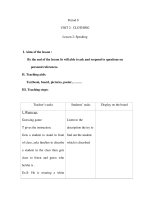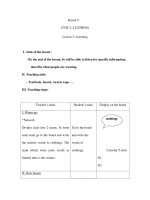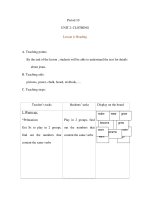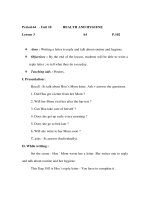lesson plan lesson plan date april 20th2008 period 64 unit 10cont life on other planets lesson 2 section speak p 85 i objectives by the end of this lesson students will be able to talk to one a
Bạn đang xem bản rút gọn của tài liệu. Xem và tải ngay bản đầy đủ của tài liệu tại đây (79.32 KB, 3 trang )
<span class='text_page_counter'>(1)</span><div class='page_container' data-page=1>
Lesson plan
<i>Date: April 20th<sub>,2008</sub></i>
<i>Period:64 Unit 10(cont) </i>LIFE ON OTHER PLANETS
Lesson 2 Section: SPEAK (p. 85)
I/ Objectives: By the end of this lesson, students will be able to talk to one
another about what they think there might be on mars, on the moon and on other
planets.
II/ Language contents:
1. Vocabulary: microorganism (n), gemstone (n), sparkling (adj),
creature (n), trace (n), mineral (n).
2. Grammar: Revision of modal verbs: may – might .
III/ Teaching aids: Text books, poster and pictures
IV/ Techniques: elicitation, ask and answer, pair work, and group work .
V/ Time: 45 minutes
VI/ Procedures:
Stages/ time Contents Notes
Warm up
5’
Pre- speaking
5’
* Wordsquare:
Earth
Sun
Mars
Moon
Mercury
(thủy)
I. Pre-teach vocabulary:
- microorganism (n): vi sinh vật
- gemstone (n): đá quý
- sparkling (adj): lấp lánh
- creature (n): sinh vật
- trace (n): dấu vết
- mineral (n). : khóang sản
<i>*Checking vocabulary : Rub out and </i>
<i>remember</i>
T asks students some
questions about the solar
system.
* Which planet is the
nearest to the sun?
* Which is the biggest?
* Which is the hottest?
Teacher introduces the new
vocabulary and gives their
meanings.
(Realia)
(Realia)
(Translation)
(Visual)
(Explanation)
- Rub out the words one at
a time. Each time you rub
out an English word, point
to the Vietnamese
translation and ask “ What
is this in English?”
When all the English
words are rubbed out , go
through the Vietnamese list
and gets students to call
out the English words
T asks students to work in
S E A R T H
</div>
<span class='text_page_counter'>(2)</span><div class='page_container' data-page=2>
While –
speaking 10’
10’
Post - speaking
10’
Homework
5’
II.Revision of modal verbs: may –
might
* Form: May/Might + infinitive
* Use: We use may, might to talk
about present or future possibility
- Might is normally a little less sure
than may.
I. Matching:
<i>Answer keys</i>:
(1) minerals
(2) water
(3) mountains
(4) plants
(5) little creatures
(6) gas
(7) gemstone
II. Drill:
Exchange
1) What are they?
They may be minerals on Mars.
2) What are they?
They might be plants on Mars.
……
III. Practice the dialogue
<i>-Nam</i>: What do these drawings say,
Hung?
<i>-Hung</i>: There might be water on
Mars.
<i>-Nam</i>: And what about those black
sparkling spots on the right corner?
<i>-Hung</i>: Well, they might be traces of
gemstones. There may be a lot of
precious stones on Mars.
IV. Making dialogues
* Sample:
<i>-You</i>: What do these drawings say?
<i>-Your friend</i>: They may be mountains
on Mars.
<i>-You</i>: And what about the red signs
on the left corner?
<i>-Your friend</i>: Well, they might be gas
on Mars
groups
Teacher explains and gives
the situations.
T asks students to work in
pairs Number from 1 to 7
from left and right.
- Teacher calls on some
students to read aloud
their sentences and
correct their mistakes.
- Teacher explains and
gives the answer keys.
*Feedback and correction
T asks students to work in
pairs
Students practice the
dialogue between Nam and
Hung on page 85
- Teacher calls on some
students to practice the
dialogue
- Teacher corrects their
pronunciation.
- T asks students to work
in pairs
T asks students to make up
similar dialogues about the
drawings, using the cues in
3a.
- Teacher calls on some
pairs of students to read
aloud their dialogues and
correct their mistakes.
T asks students to write
their dialogues in
</div>
<span class='text_page_counter'>(3)</span><div class='page_container' data-page=3></div>
<!--links-->









